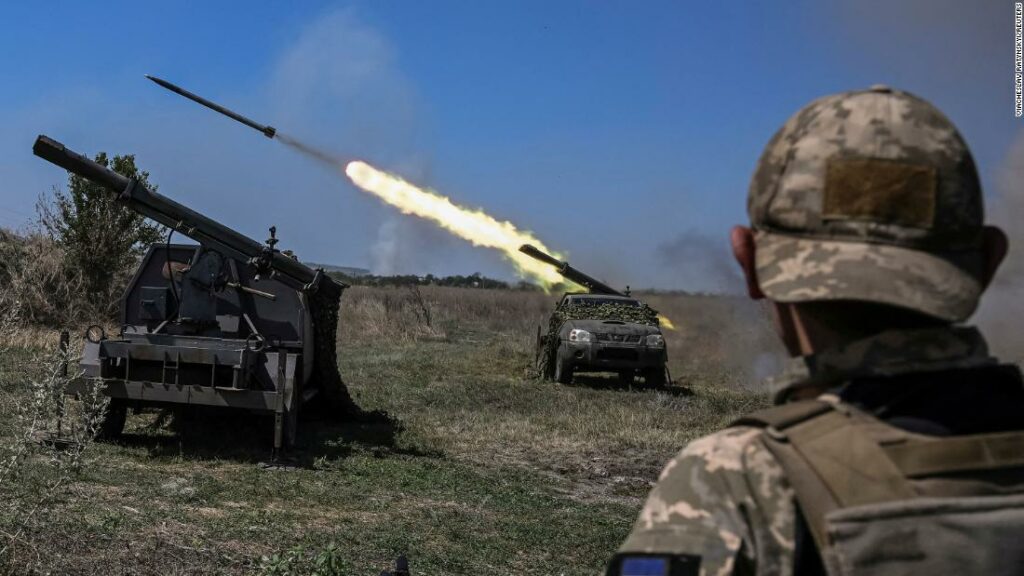Ukrainian Commander Urges Action to Prevent Russian Defenses in Bakhmut Area
In the ongoing conflict between Ukraine and Russia, a Ukrainian commander in the Bakhmut area has emphasized the importance of preventing the Russians from establishing strong defenses. Maksym Zhorin, deputy commander of the 3rd Assault Brigade, has highlighted the need to maintain momentum and hinder the enemy’s ability to create a robust defense system.
The Battle for Bakhmut
Zhorin explained that the enemy has already made significant efforts in the Zaporizhzhia sector, where Ukrainian forces are struggling to break down layers of Russian fortifications and minefields. He stressed the urgency of preventing the enemy from further fortifying their positions and planting mines, as it would pose a significant problem for Ukrainian forces.
Progress and Challenges
While Ukrainian forces have made slight progress to the south and north-west of Bakhmut in recent weeks, they have yet to threaten Russian supply lines into the ruined city. Despite this, Ukrainian officials have confirmed that their military remains on the offensive in the Bakhmut direction, advancing ”meter by meter.”
The Enemy’s Tactics
According to Illya Yevlash, head of the press service of the Eastern Military Grouping, Russian forces have been resorting to counterattacks and shelling Ukrainian positions with multiple rocket launchers and cannon artillery. Yevlash noted that the enemy’s tactics in the Bakhmut area remain virtually unchanged, with assault units consisting of convicts attempting to storm positions without proper equipment, followed by regular army soldiers.
The Need for Action
It is crucial for Ukrainian forces to prevent the enemy from establishing strong defenses in the Bakhmut area. By constantly disrupting their positions and inflicting damage, Ukrainian forces can hinder the enemy’s ability to take required actions. Allowing the enemy time and opportunity to dig in and plant mines would only exacerbate the situation.
Stay Informed
For more updates on the situation in Bakhmut, stay tuned. The conflict continues to unfold, and Ukrainian forces are determined to make progress despite the challenges they face.
(Note: This post includes contributions from CNN’s Yulia Kesaieva and Radina Gigova.)
Breaking Updates on Russia’s Ongoing Conflict in Ukraine
Introduction:
The ongoing conflict between Russia and Ukraine has been a matter of international concern for several years now. The situation has escalated recently, with new developments and updates emerging regularly. This article aims to provide a comprehensive overview of the breaking updates on Russia’s ongoing conflict in Ukraine, shedding light on the latest events and their implications.
1. Escalation in Eastern Ukraine:
In recent weeks, there has been a significant escalation of violence in Eastern Ukraine, particularly in the Donetsk and Luhansk regions. Reports indicate that Russian-backed separatist forces have intensified their attacks on Ukrainian government positions, resulting in a surge in casualties and displacement of civilians. The Ukrainian government has accused Russia of providing military support to the separatists, a claim that Moscow vehemently denies.
2. Russian Troop Buildup:
One of the most alarming updates is the substantial buildup of Russian troops near the Ukrainian border. Satellite imagery and intelligence reports suggest that Russia has deployed tens of thousands of soldiers, along with heavy weaponry, in close proximity to Ukraine. This has raised concerns among the international community, with fears of a potential full-scale invasion or further aggression by Russia.
3. Diplomatic Efforts:
Amidst the escalating tensions, diplomatic efforts to de-escalate the conflict have been ongoing. The United States, European Union, and other international actors have condemned Russia’s actions and called for an immediate cessation of hostilities. Diplomatic talks, including the Normandy Format and the Trilateral Contact Group, have been held to find a peaceful resolution. However, progress has been limited, and a lasting solution remains elusive.
4. Humanitarian Crisis:
The ongoing conflict has exacerbated the humanitarian situation in Ukraine. Thousands of people have been displaced, seeking refuge in overcrowded camps or fleeing to neighboring countries. Access to basic necessities, such as food, water, and healthcare, has become increasingly challenging for those affected by the conflict. Humanitarian organizations are working tirelessly to provide aid, but the scale of the crisis requires greater international support.
5. International Response:
The international community has responded to the crisis with a mix of condemnation, sanctions, and support for Ukraine. The United States and the European Union have imposed economic sanctions on Russia, targeting key sectors of its economy. These measures aim to exert pressure on Russia to change its course of action. Additionally, military assistance and training have been provided to Ukraine by several countries, including the United States and Canada.
Conclusion:
The breaking updates on Russia’s ongoing conflict in Ukraine paint a grim picture of the situation. The escalation of violence, Russian troop buildup, and the resulting humanitarian crisis demand urgent attention from the international community. Diplomatic efforts must be intensified to find a peaceful resolution, while providing necessary support to Ukraine to address the humanitarian needs of its affected population. It is crucial for the global community to remain engaged and committed to resolving this conflict, ensuring stability and peace in the region.








